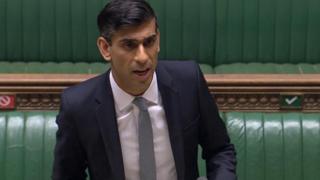Summer Statement: Key points at a glance
 Image copyright House of Commons/PA
Image copyright House of Commons/PA Chancellor Rishi Sunak has delivered his summer economic plan to help the UK economy recover from the impact of the coronavirus pandemic.
It includes plans to protect jobs, help younger workers and encourage spending with measures such as a VAT cut for leisure activities and a restaurant voucher scheme.
Here is a summary of the main points.
‘Job retention bonus’ to encourage firms to retain furloughed staff
- A one-off £1000 payment to employers for every furloughed employee retained to the end of January 2021
- Applies to workers earning over £520 per month, UK-wide
- Cost estimated at up to £9.4bn
Six-month VAT cut for restaurants, hotels and attractions
- Value added tax cut from 20% to 5% from 13 July to 12 January 2021 for selected areas
- Food and non-alcoholic drinks in restaurants, pubs and cafes, as well as hot takeaway food will be covered
- Accommodation in hotels and B&Bs and admission to attractions such as theme parks and cinemas also affected
- What the Chancellor’s summer statement means for you
Stamp duty cut and ‘green homes grant’
- The threshold for stamp duty on residential property in England and Northern Ireland will rise from £125,000 to £500,000
- Applies from 8 July until 31 March 2021
- Almost nine out of 10 transactions would be tax-free as a result
- Expected to cost around £3.8bn
- Up to £5,000 per household for projects to make homes more energy efficient in England
- Will match owners or landlords’ spend, £2 for £1 for most homes
- Up to £10,000 per household fully funded for low-income households
- How will the stamp duty holiday work?
Discount on restaurant meals in August
- «Eat out to help out» scheme offers 50% discount for every diner, up to £10 a head, from Monday to Wednesday throughout August
- Covers food and non-alcoholic drinks only
- Applies at participating restaurants, pubs, cafes etc
- Restaurant owners can claim the discount in full from the government via an online form
- Chancellor gives diners 50% off on eating out
Support for young workers
- «Kickstart scheme»: £2bn fund to pay for six-month work placements for 16 to 24-year-olds on universal credit
- Payments cover national minimum wage for 25 hours per week, plus national insurance and pension contributions for Great Britain
- £1,000 grant per trainee for employers who take on new trainees aged 16-24 in England, aiming to triple trainee numbers
- £2,000 grant for employers per apprentice under 25 hired, £1,500 for those over 25, for six months starting 1 August (in England)
- Doubling the number of work coaches at Jobcentre Plus across Great Britain, with extra help for young jobseekers
- £150m extra for the Flexible Support Fund, which provides help for jobseekers (in Great Britain)
- £101m to fund studies for 18 to 19-year-olds in England unable to find work
- £95m to expand the Work and Health Programme to provide additional support for unemployed people on benefits for more than three months
- A job-finding support service for those out of work for less than three months, costing £40m
- £32m over two years for a National Careers Service to provide advice on work and training (in England)
- Sunak unveiling ‘kickstart jobs scheme’ for young people
- ‘Rishi Sunak: Apprentices have been overlooked’

Media playback is unsupported on your device
Infrastructure and decarbonisation
- £1bn of grants to public sector bodies to improve energy efficiency.
- £50m towards a social housing decarbonisation fund, aimed to improve the energy efficiency of socially rented homes.
- The Chancellor also gave further details of a £5.6bn package of infrastructure measures, previously announced by the Prime Minister on 30 June.
- This includes measures for hospitals, school buildings, transport, and housing.


